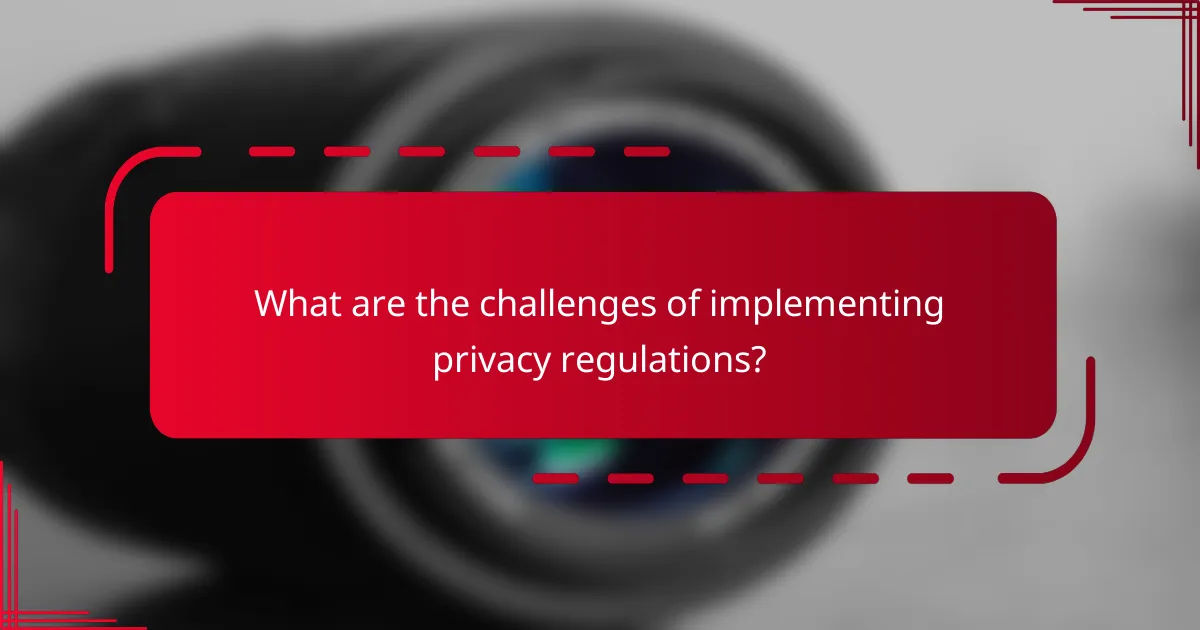Privacy regulations have a profound impact on businesses in the UK, necessitating strict compliance and a reevaluation of customer data management practices. As organizations navigate these legal frameworks, including the GDPR and the Data Protection Act 2018, they face both challenges and opportunities to enhance their data protection strategies and foster customer trust.

How do privacy regulations impact businesses in the UK?
Privacy regulations significantly affect businesses in the UK by imposing strict compliance requirements and altering how customer data is managed. Companies must adapt their operations to ensure they meet these legal standards, which can lead to both challenges and opportunities for improved data practices.
Increased compliance costs
Compliance with privacy regulations often results in increased operational costs for businesses. Companies may need to invest in new technologies, hire data protection officers, and conduct regular audits to ensure adherence to regulations like the UK General Data Protection Regulation (GDPR).
These costs can vary widely depending on the size of the business and the complexity of its data handling processes. Small to medium enterprises (SMEs) might face lower costs compared to larger corporations, but even SMEs should budget for compliance-related expenses, which can range from thousands to tens of thousands of pounds annually.
Changes in data handling practices
Privacy regulations necessitate significant changes in how businesses handle customer data. Organizations must implement stricter data collection, storage, and processing protocols to comply with legal requirements.
For example, businesses are encouraged to adopt data minimization practices, collecting only the information necessary for specific purposes. Additionally, they must ensure that customer consent is obtained transparently and that individuals can easily access or delete their data upon request.
Impact on customer trust
Adhering to privacy regulations can enhance customer trust, as consumers are increasingly concerned about how their data is used. When businesses demonstrate a commitment to protecting personal information, they can foster stronger relationships with their customers.
Conversely, failure to comply with regulations can lead to reputational damage and loss of trust. Companies should communicate their data protection measures clearly to customers, emphasizing transparency and accountability to build confidence in their brand.

What strategies can businesses adopt to comply with privacy regulations?
Businesses can adopt several strategies to comply with privacy regulations, including implementing robust data protection policies, conducting regular audits, and training employees on compliance. These strategies help ensure that organizations not only meet legal requirements but also build trust with their customers.
Implementing data protection policies
Establishing clear data protection policies is essential for compliance with privacy regulations. These policies should outline how personal data is collected, stored, processed, and shared, ensuring transparency and accountability. Businesses should regularly review and update these policies to reflect changes in regulations and operational practices.
Consider including specific guidelines on data access, retention periods, and breach notification procedures. For example, a company might specify that customer data will be retained for no longer than five years unless otherwise required by law.
Conducting regular audits
Regular audits are crucial for assessing compliance with privacy regulations and identifying potential vulnerabilities. Businesses should schedule audits at least annually, focusing on data handling practices, security measures, and policy adherence. This proactive approach can help mitigate risks before they lead to breaches or non-compliance penalties.
During audits, consider using a checklist that includes data inventory, access controls, and incident response plans. This will help ensure a comprehensive review and facilitate the identification of areas needing improvement.
Training employees on compliance
Training employees on privacy compliance is vital for fostering a culture of data protection within the organization. Regular training sessions should cover the importance of data privacy, the specifics of relevant regulations, and the company’s policies. Engaging employees through interactive workshops can enhance understanding and retention of information.
To maximize effectiveness, tailor training programs to different roles within the company. For instance, customer service representatives may need to focus on handling personal data requests, while IT staff should concentrate on data security measures and incident response protocols.

What are the key privacy regulations affecting UK businesses?
The key privacy regulations affecting UK businesses include the General Data Protection Regulation (GDPR), the Data Protection Act 2018, and the Privacy and Electronic Communications Regulations (PECR). These regulations set the framework for data protection and privacy rights, requiring businesses to implement specific measures to safeguard personal information.
General Data Protection Regulation (GDPR)
The GDPR is a comprehensive regulation that governs data protection and privacy across the European Union and the UK. It mandates that businesses must obtain explicit consent from individuals before processing their personal data and provides individuals with rights such as access, rectification, and erasure of their data.
Businesses must ensure compliance by implementing data protection policies, conducting impact assessments, and appointing a Data Protection Officer (DPO) if necessary. Non-compliance can result in hefty fines, often reaching up to 4% of annual global turnover or €20 million, whichever is greater.
Data Protection Act 2018
The Data Protection Act 2018 complements the GDPR and provides additional provisions specific to the UK. It establishes the Information Commissioner’s Office (ICO) as the regulatory authority responsible for enforcing data protection laws and handling complaints.
This Act includes specific rules for processing personal data related to criminal convictions and offenses, as well as provisions for the processing of personal data for national security and immigration purposes. Businesses must be aware of these additional requirements to ensure full compliance.
Privacy and Electronic Communications Regulations (PECR)
The PECR governs privacy rights in relation to electronic communications, including marketing calls, emails, texts, and cookies. It requires businesses to obtain consent before sending direct marketing communications and provides individuals with the right to opt-out.
Businesses must also ensure that they comply with rules regarding the use of cookies on their websites, including informing users and obtaining consent for non-essential cookies. Failure to adhere to PECR can result in enforcement actions and fines from the ICO.

How can businesses adapt to evolving privacy regulations?
Businesses can adapt to evolving privacy regulations by implementing robust compliance strategies, investing in technology, and maintaining ongoing communication with legal experts. These steps help ensure that organizations not only meet current requirements but also anticipate future changes in the regulatory landscape.
Investing in privacy-focused technologies
Investing in privacy-focused technologies is crucial for businesses aiming to comply with privacy regulations. Solutions such as data encryption, secure access controls, and privacy management software can help safeguard sensitive information and streamline compliance processes.
For example, using encryption can protect customer data during transmission and storage, reducing the risk of breaches. Additionally, privacy management tools can assist in tracking data usage and consent, making it easier to demonstrate compliance with regulations like the GDPR or CCPA.
Engaging with legal experts
Engaging with legal experts is essential for navigating the complexities of privacy regulations. Legal professionals can provide tailored advice, helping businesses understand their obligations and the implications of non-compliance.
Regular consultations with legal advisors can help identify potential risks and ensure that privacy policies are up-to-date. This proactive approach can prevent costly penalties and enhance trust with customers by demonstrating a commitment to data protection.
Staying informed on regulatory changes
Staying informed on regulatory changes is vital for businesses to remain compliant with evolving privacy laws. Organizations should monitor updates from regulatory bodies and industry associations to understand new requirements and best practices.
Subscribing to newsletters, attending webinars, and participating in industry forums can provide valuable insights. Establishing a dedicated team or appointing a compliance officer can further ensure that the organization is prepared to adapt to changes in privacy regulations effectively.

What are the challenges of implementing privacy regulations?
Implementing privacy regulations presents several challenges, including navigating complex compliance requirements and allocating sufficient resources. Organizations must adapt to evolving laws while ensuring they meet legal obligations without compromising operational efficiency.
Complexity of compliance
The complexity of compliance stems from the diverse and often overlapping privacy regulations across different jurisdictions. For instance, the General Data Protection Regulation (GDPR) in Europe imposes strict data handling and processing rules, while the California Consumer Privacy Act (CCPA) has its own set of requirements. This patchwork of regulations can create confusion and necessitate tailored compliance strategies.
Organizations must invest time in understanding the specific requirements of each regulation applicable to their operations. This may involve conducting thorough audits, implementing new data management systems, and ensuring employee training on compliance practices. A clear roadmap for compliance can help mitigate risks associated with non-compliance.
Resource allocation issues
Resource allocation issues arise when organizations struggle to dedicate sufficient personnel and budget to meet privacy regulation demands. Many companies may underestimate the financial and human resources required for compliance, leading to inadequate preparation and potential penalties. Allocating resources effectively is crucial for successful implementation.
To address this challenge, organizations should assess their current capabilities and identify gaps in compliance readiness. Establishing a dedicated privacy team or hiring external consultants can help bridge these gaps. Additionally, prioritizing high-risk areas for compliance can ensure that resources are used efficiently and effectively.
